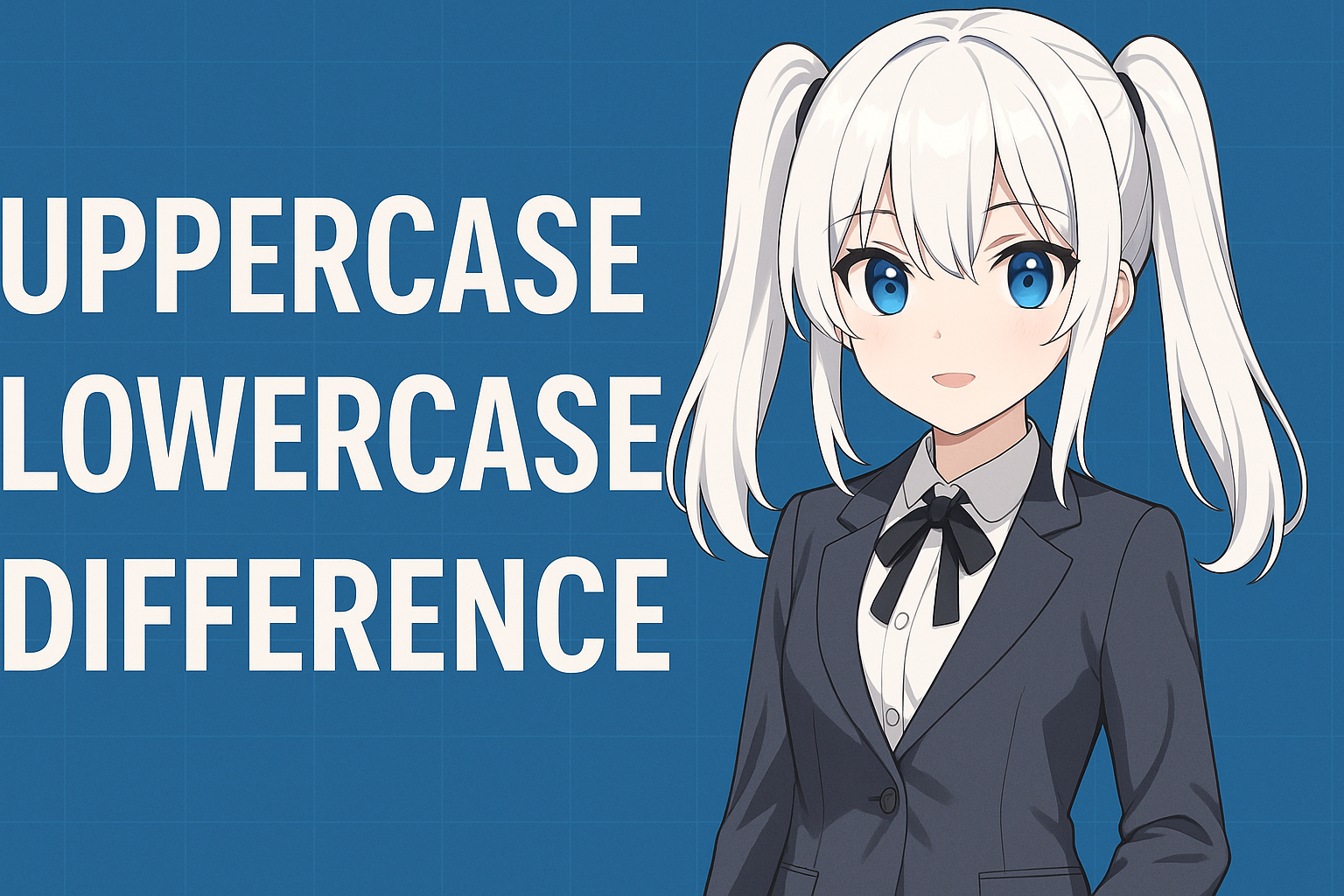目次
- 1 1. Introduction
- 2 2. C language is a case-sensitive language
- 3 3. Determining Uppercase vs Lowercase (Single Character)
- 4 4. Methods for Comparing Strings Case‑Sensitive and Case‑Insensitive
- 5 5. Case Conversion (Uppercase ⇔ Lowercase Conversion)
- 6 6. Common Mistakes, Pitfalls, and Error Cases
- 7 7. Mini column on differences with other languages (Python, Java, etc.)
- 8 8. Summary Table of Uppercase and Lowercase Comparisons
- 9 9. Summary
- 10 10. FAQ (Frequently Asked Questions and Answers)
- 11 11. Related Links & References
1. Introduction
When programming in C, you often encounter issues with case sensitivity when dealing with characters and strings. For example, many people have struggled with situations where things don’t work as expected when checking alphabetic user input, comparing file names or passwords, or handling conditional branches. In fact, C is designed to strictly distinguish uppercase and lowercase letters. Failing to understand this correctly can lead to bugs and security mistakes. In this article we will carefully explain the case sensitivity in C from the basics. We cover detection methods, the appropriate use of comparison functions, practical sample code, common pitfalls, and differences from other languages, all presented in an easy-to-understand way for beginners. By the end of this article, you’ll have a correct understanding of how to handle case and be able to develop in C with greater confidence.2. C language is a case-sensitive language
In C, uppercase and lowercase letters of the alphabet are treated as completely distinct characters. This rule applies to all alphabetic characters in the program, such as variable names, function names, and keywords. For example,main and Main are recognized as distinct identifiers within the same program. Value and value, as well as sum and SUM, are also treated as separate variables or functions, so a careless typo can cause unintended behavior or compilation errors. This case sensitivity stems from the original design philosophy of C. The character encoding used by C (primarily ASCII) assigns different numeric values to uppercase and lowercase letters. For instance, A is 65 and a is 97, so the same letter has completely different values depending on case. Therefore, in C, the case difference matters not only for variable and function names but also when comparing character data itself. For example, using the strcmp function to compare strings, “Hello” and “hello” are considered different. Thus, understanding C’s “case-sensitive” nature is essential for ensuring correct program behavior and preventing bugs. In later chapters, we will discuss concrete methods for case-aware testing and comparison in more detail.3. Determining Uppercase vs Lowercase (Single Character)
If you want to determine whether a single character is uppercase or lowercase in C, there are several simple methods. Here we introduce two commonly used representative methods.1. Range Check Using Character Codes
Uppercase letters (A–Z) and lowercase letters (a–z) are defined as consecutive values in the ASCII code. Therefore, you can determine uppercase or lowercase with a condition like the following.if ('A' <= c && c <= 'Z') {
// c is uppercase
}
if ('a' <= c && c <= 'z') {
// c is lowercase
}2. Using Functions from the Standard Library (ctype.h)
A more concise and readable approach is to use the C standard libraryctype.h. ctype.h provides convenient functions for character classification.isupper(c)… returns true (non‑zero) if c is an uppercase alphabetic characterislower(c)… returns true if c is a lowercase alphabetic character
#include <stdio.h>
#include <ctype.h>
int main(void) {
char c;
printf("Please enter a single alphabetic character: ");
scanf("%c", &c);
if (isupper(c)) {
printf("The entered character is uppercase.
");
} else if (islower(c)) {
printf("The entered character is lowercase.
");
} else {
printf("The entered character is not an alphabetic letter.
");
}
return 0;
}isupper() and islower() can handle non‑alphabetic characters appropriately, making them highly practical. Thus, in C you can easily determine uppercase or lowercase for each character. By choosing the method based on your needs and readability, you can prevent misclassification and bugs. In the next chapter, we will discuss in detail how to compare uppercase and lowercase for multiple characters (strings).4. Methods for Comparing Strings Case‑Sensitive and Case‑Insensitive
When comparing strings composed of multiple characters in C, the functions and implementation methods used vary depending on whether case sensitivity is required. Here, we will explain the typical comparison methods, their differences, and practical usage in detail.1. Case‑Sensitive Comparison Using the strcmp Function
The standard C library function strcmp compares two strings and determines whether their contents match exactly. This function strictly distinguishes between uppercase and lowercase letters.#include <stdio.h>
#include <string.h>
int main(void) {
char s1[100], s2[100];
printf("Please enter the first string: ");
scanf("%s", s1);
printf("Please enter the second string: ");
scanf("%s", s2);
if (strcmp(s1, s2) == 0) {
printf("The two strings match.
");
} else {
printf("The two strings do not match.
");
}
return 0;
}2. Case‑Insensitive Comparison (strcasecmp or stricmp)
Depending on the platform, you can use a function such as strcasecmp (or stricmp on Windows) that compares strings while ignoring case.strcasecmp(s1, s2)… compare ignoring case- On Windows, use
_stricmp(s1, s2)orstricmp(s1, s2)
#include <stdio.h>
#include <strings.h> // Linux or macOS
// #include <string.h> // Use stricmp or _stricmp on Windows
int main(void) {
char s1[100], s2[100];
printf("Please enter the first string: ");
scanf("%s", s1);
printf("Please enter the second string: ");
scanf("%s", s2);
if (strcasecmp(s1, s2) == 0) {
printf("The two strings match (ignoring case).
");
} else {
printf("The two strings do not match.
");
}
return 0;
}3. Comparing Only the First n Characters with strncmp or strncasecmp
If you want to perform partial matches or compare only a limited length, you can use strncmp (case‑sensitive) or strncasecmp (case‑insensitive).if (strncasecmp(s1, s2, 5) == 0) {
// The first 5 characters match
}4. You Can Implement Your Own When Unavailable
Ifstrcasecmp or stricmp are unavailable, you can implement your own conversion and comparison one character at a time using tolower() or toupper(). Thus, in C, whether you distinguish case dramatically changes the functions and comparison methods you use. Choose the appropriate function for your purpose to avoid bugs and unintended behavior. In the next chapter, we will discuss methods for converting case.5. Case Conversion (Uppercase ⇔ Lowercase Conversion)
In C, there are many situations where you need to convert characters between uppercase and lowercase. For example, you may want to normalize user input to all lowercase for comparison, or capitalize output for readability. This section introduces the typical methods.1. Standard Library toupper() and tolower() Functions
The C standard library header ctype.h provides functions for converting a single character to uppercase or lowercase.toupper(c)— Returns the uppercase version if c is lowercase; otherwise returns c unchangedtolower(c)— Returns the lowercase version if c is uppercase; otherwise returns c unchanged
Example: Converting Lowercase to Uppercase or Uppercase to Lowercase
#include <stdio.h>
#include <ctype.h>
int main(void) {
char c;
printf("Please enter a single alphabetic character: ");
scanf(" %c", &c);
printf("Uppercase: %cn", toupper(c));
printf("Lowercase: %cn", tolower(c));
return 0;
}2. Converting an Entire String
If you want to convert an entire multi-character string, you can loop over each character and usetoupper() or tolower().Example: Converting a String to All Lowercase
#include <stdio.h>
#include <ctype.h>
#include <string.h>
int main(void) {
char str[100];
printf("Please enter a string: ");
scanf("%s", str);
for (int i = 0; i < strlen(str); i++) {
str[i] = tolower(str[i]);
}
printf("Lowercase conversion result: %sn", str);
return 0;
}3. Conversion Using Arithmetic Operations
It relies on ASCII codes, where uppercase and lowercase letters differ by a constant offset (32). Therefore, the following conversions are possible.// Lowercase to Uppercase
if ('a' <= c && c <= 'z') {
c = c - ('a' - 'A');
}
// Uppercase to Lowercase
if ('A' <= c && c <= 'Z') {
c = c + ('a' - 'A');
}toupper() and tolower() is generally recommended.
As shown, converting between uppercase and lowercase in C is straightforward. This technique is especially useful when handling user input, file names, or password verification where case should be ignored. The next chapter will discuss common pitfalls and considerations when performing such conversions and comparisons.6. Common Mistakes, Pitfalls, and Error Cases
When handling case sensitivity, comparison, and conversion in C, a small oversight or misunderstanding can lead to bugs and issues. Here we summarize common mistakes, pitfalls, and actual error examples.1. Misusing strcmp
strcmp function compares with case sensitivity. Therefore, “Hello” and “hello” are considered not matching.
If you unintentionally want to compare ignoring case and use strcmp, it won’t behave as expected and can cause confusion. Example: Unexpected Mismatchif (strcmp("Hello", "hello") == 0) {
// condition does not hold
}strcmp‘s return value is not zero, so it is judged as “not matching”.
2. Forgetting Case Conversion
When comparing user input or external data, you often forget to normalize case before comparison. For example, without conversion during password authentication or filename comparison, users may not be able to use the system as expected. Example: Not Converting to Lowercase Before Comparisonif (strcmp(user_input, "password") == 0) {
// If the input value is "Password" or "PASSWORD", it will not match
}tolower() before comparison prevents the mistake.3. strcasecmp and stricmp Availability and Platform Dependence
strcasecmp and stricmp are not part of the standard C language.
Their use is limited by the environment.- Linux/UNIX systems …
strcasecmp - Windows …
stricmpor_stricmp - Older environments may support neither
tolower() or toupper().4. Compile‑time and Run‑time Error Examples
- Missing header file includes (
ctype.h,string.h) - Typo in function name (e.g.,
toloower,toLoweretc.) - Buffer overflow due to insufficient array size
printf("%c", tolower('A'));#include <ctype.h>5. Bug Example: Authentication Failure Due to Case Mismatch
Case: Password Fails During Login Authentication- The system treats “Password” and “password” as different
- Users often don’t care about case
- Consequently, even with the correct password, authentication fails
- Normalize all input to lowercase
- Specify clearly in the specification whether case matters and inform users
7. Mini column on differences with other languages (Python, Java, etc.)
When programming in C, you might wonder, “How do other languages handle case sensitivity?” Here we briefly introduce the differences between C and other commonly used languages such as Python and Java.1. Distinction of identifiers (variable names, function names)
Like C, most modern languages distinguish case in identifiers.- C Example:
valueandValueare different - Java Fully distinguished. It is strict about case in class and method names as well.
- Python Also case‑sensitive. Python’s naming conventions are clearly defined in PEP 8, so consistent use of case is recommended.
- JavaScript / C++ / Go, etc. All are case‑sensitive.
2. Differences in string comparison
- C String comparison uses functions such as
strcmp, and case distinction is the default. - Python You can compare with the
==operator, and it is case‑sensitive. To perform a case‑insensitive comparison, convert usinglower()orcasefold()before comparing.
if s1.lower() == s2.lower():
# case-insensitive comparison- Java The
equals()method is case‑sensitive, whileequalsIgnoreCase()provides a case‑insensitive comparison. - JavaScript The
===operator is case‑sensitive. For case‑insensitive comparison, usetoLowerCase()and similar methods to normalize before comparing.
3. User‑focused cautions
If you’re used to other languages, you might assume that “string comparisons automatically ignore case.” However, most languages require explicit case distinction, so this point requires attention not only in C but also in other languages.4. Differences in coding conventions and practices
For example, in Java class names are recommended to start with an uppercase letter (PascalCase) and variable names with a lowercase letter (camelCase), so naming conventions embed case meaning. In C, conventions are free, but establishing consistent naming rules is advisable for readability and to avoid confusion. Thus, case sensitivity is an important point in many programming languages, not just C. Since comparison methods and naming rules vary slightly between languages, be especially mindful of them when relearning or transitioning to other languages.8. Summary Table of Uppercase and Lowercase Comparisons
Here we present a quick-reference table that neatly summarizes the representative C language functions and methods for determining, comparing, and converting uppercase and lowercase characters, organized by use case. When you’re unsure during actual coding, refer to this list.Quick Reference Table by Use Case – Main Functions/Methods
| Use | Case Sensitive/Insensitive | Main Functions/Methods | Features/Notes |
|---|---|---|---|
| Determine if a single character is uppercase or lowercase | No distinction (check) | isupper(c), islower(c) | ctype.h-defined, checks alphabetic characters only |
| Convert a single character to uppercase/lowercase | – | toupper(c), tolower(c) | ctype.h, non‑alphabetic characters remain unchanged |
| Check if a character is alphabetic | – | isalpha(c) | ctype.h, only A‑Z/a‑z |
| Compare strings with case sensitivity | Case-sensitive | strcmp(s1, s2) | Standard library, strict comparison using ASCII codes |
| Compare strings without case sensitivity | Case-insensitive | strcasecmp(s1, s2) | Non‑standard function, platform‑dependent. Available on Linux/UNIX systems |
| Compare the first n characters of strings with case sensitivity | Case-sensitive | strncmp(s1, s2, n) | Compares only the first n characters |
| Compare the first n characters of strings without case sensitivity | Case-insensitive | strncasecmp(s1, s2, n) | Non‑standard, Linux/UNIX |
| Platform‑dependent case‑insensitive comparison (Windows) | Case-insensitive | stricmp(s1, s2), _stricmp(s1, s2) | Windows/MSVC. Implement your own if unavailable |
| Custom comparison (case‑insensitive) | Case-insensitive | Loop + tolower()/toupper() | Convert all characters before comparing |
Key Points for Usage Examples
- When comparing strings, choose functions based on case‑sensitivity
- Verify that non‑standard functions like
strcasecmpare available in your development environment - For portability and maintainability, converting with
tolower()ortoupper()followed bystrcmpis reliable
9. Summary
Up to this point, we have comprehensively explained case sensitivity in C, covering detection methods, comparison tips, concrete sample code, common mistakes and cautions, and differences from other languages. In C, uppercase and lowercase letters are treated as completely distinct characters. This specification affects not only variable and function names but also strings and per-character comparisons and checks. Processing without regard to case can lead to unexpected bugs and errors, so it is important to have the correct knowledge. By using the functions introduced in the article—isupper() and islower() for single-character checks, toupper() and tolower() for conversion, and strcmp() and strcasecmp() for comparisons—you can write flexible programs tailored to the situation. Especially for string comparisons, choosing an implementation that matches your intent—’case-sensitive’ or ‘case-insensitive’—is key. Moreover, being aware of common mistakes and error patterns helps prevent trouble in real development environments.Common Implementation Patterns (Recommended Examples)
- Normalize the case of input values before comparing
- Check whether environment-dependent functions are available, and consider custom implementations if not
- Be mindful of case rules when naming and coding
10. FAQ (Frequently Asked Questions and Answers)
Here, we have compiled the most frequently asked questions and their answers regarding case sensitivity and comparison in the C language. Let’s clear up any small doubts in this section. Q1. What is the difference betweenstrcmp and strcasecmp? A. strcmp compares two strings by strictly distinguishing uppercase and lowercase characters. In contrast, strcasecmp (or Windows’ stricmp) is a convenient function that can compare without distinguishing case. However, strcasecmp and stricmp are not standard C functions, and their availability varies by environment. Q2. What should I do if strcasecmp or stricmp is unavailable? A. In that case, a custom implementation that loops through the strings, converting each character with tolower() or toupper() before comparing, is effective. The common approach is to normalize everything to lowercase (or uppercase) and then compare with strcmp. Q3. How can I easily determine whether a character is uppercase or lowercase? A. Using the standard library ctype.h functions isupper() (uppercase test) and islower() (lowercase test) is simple and recommended.if (isupper(c)) { /* uppercase */ }
if (islower(c)) { /* lowercase */ }sum and SUM are recognized as completely different variables. Be careful with typos and naming errors. Q5. Can Japanese or multibyte characters be tested or converted with isupper or tolower? A. No, generally isupper and tolower only work with ASCII letters (A–Z, a–z). They do not support Japanese or other multibyte characters. If multilingual or internationalization support is needed, use dedicated libraries or Unicode-aware functions. Q6. I don’t want to worry about case every time I compare. What should I do? A. Convert the strings to all lowercase (or uppercase) before comparing, so you won’t have to think about case each time. Alternatively, if your environment supports case-insensitive comparison functions like strcasecmp, make good use of them. Q7. What happens with full-width letters or special characters when comparing with strcmp or strcasecmp? A. These functions are designed with ASCII characters in mind, so they may not handle full-width letters, symbols, or special characters correctly. When Japanese or full-width letters are mixed in, consider using a multibyte string library (e.g., mbstowcs or wcsicmp) instead. Refer to this FAQ to quickly find answers when you encounter confusion or questions during implementation.11. Related Links & References
In this chapter, we compile recommended links and reference information for those who want to deepen their understanding of uppercase and lowercase detection, comparison, and conversion in C, or are looking for practical, useful information. Please make use of these resources during learning and implementation.Useful External References & Official Documentation
- ASCII Code Table (external site) A handy list that shows the code values of alphabets and symbols at a glance.
- Linux man page – strcasecmp(3) Detailed reference for case‑insensitive comparisons when needed.



